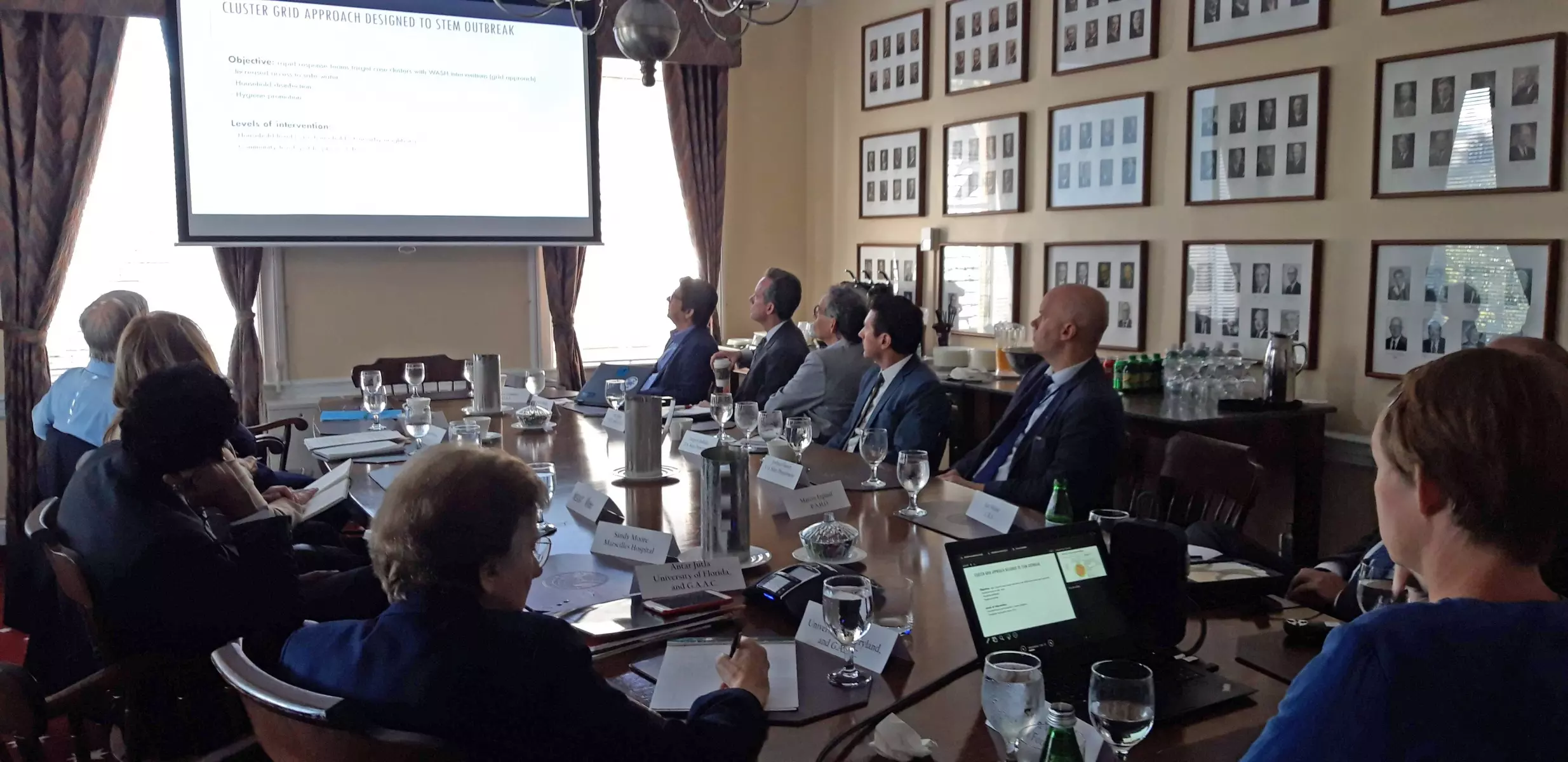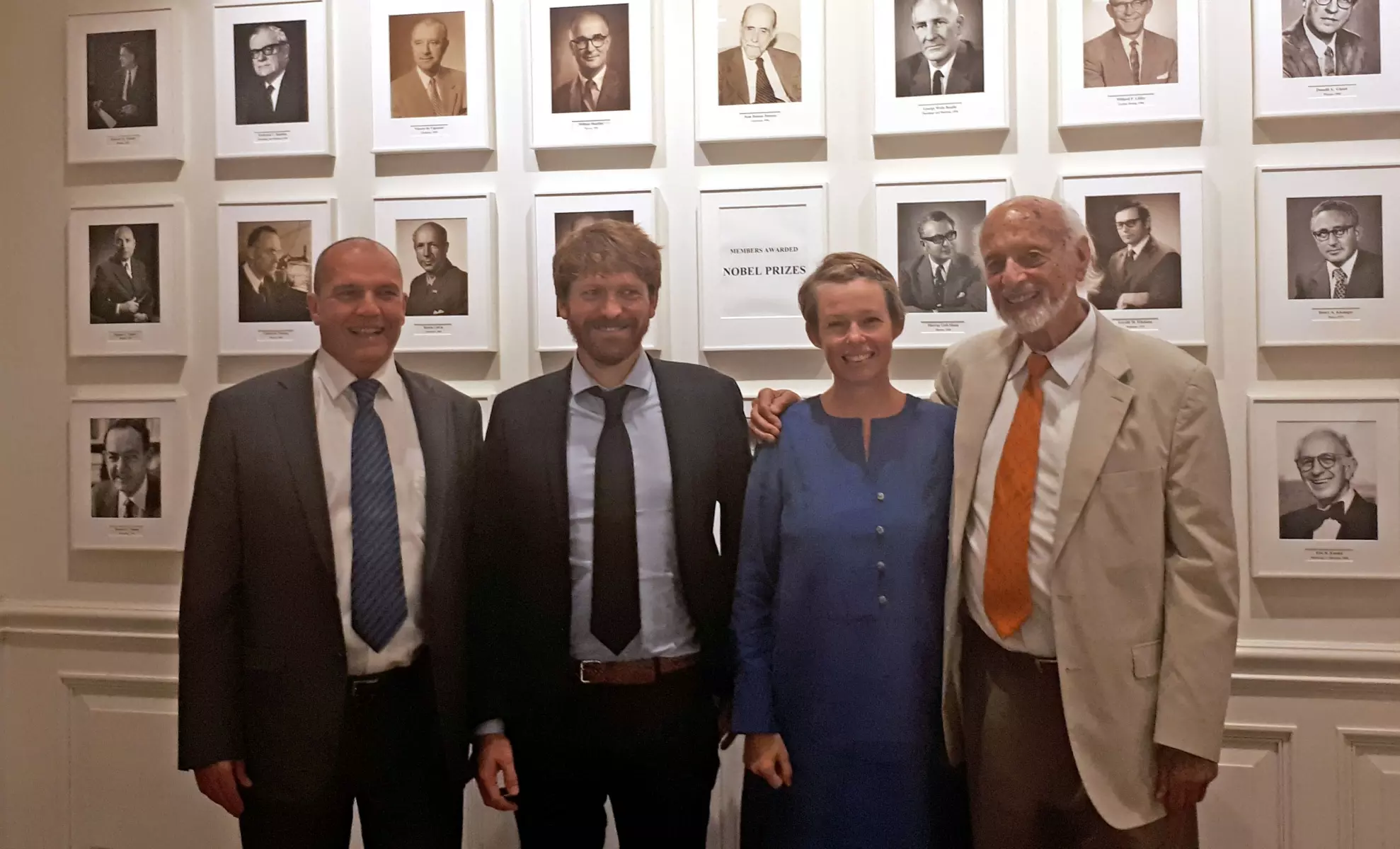
Progress in the fight against cholera fuelled the last meeting of the Global Alliance Against Cholera Advisory Board. On Tuesday, September 24, at the Cosmos Club in Washington, DC, USA, new approaches to urban outbreak control, models to predict cholera outbreaks, and initiatives to prevent water-related diseases were discussed. Representatives from the Veolia Foundation, the Centers for Disease Control and Prevention (CDC), the Pan American Health Organization, the Millennium Water, Water 2020, Catholic Relief Services, the Organization of American States, the U.S. Department of State, and the Universities of Maryland and Florida participated in the discussions.
Cholera outbreak control
Regarding cholera outbreak control, Sandy Moore, a cholera consultant with the Veolia Foundation, described a novel targeted WASH strategy implemented in Kinshasa that quickly brought the recent cholera outbreak in the city under control. The response strategy, developed by Didier Bompangue and colleagues in the Democratic Republic of the Congo (DRC), involved specific WASH intervention packages targeting case households, nearby neighbors and public areas in case clusters, which was organized using a grid approach. WASH activities focused on emergency water supply, household water treatment and safe storage, home disinfection and hygiene promotion. Assessment of the weekly cholera case numbers following response implementation in the most-affected health zones showed a decrease by an average of 57% after two weeks and 86% after four weeks. With appropriate adaptations, a similar approach may be useful to quickly stop cholera transmission in other urban settings.
Cholera preparedness efforts

In Haiti after Hurricane Matthew, the group used satellite-derived data on precipitation, gridded air temperature, the hurricane path and information on WASH infrastructure to track changing environmental conditions conducive to growth of pathogenic vibrios and to predict the likelihood of cholera cases. This initiative has also been applied in Yemen to predict areas likely to experience a cholera outbreak and subsequently guide public health interventions.
Prevention of water-related diseases
Concerning prevention of water-related diseases, Eric Mintz, cholera epidemiologist from the CDC in Atlanta, Thierry Vandevelde, executive director and Romain Verchère, Project Manager at the Veolia Foundation in Paris, France discussed projects to improve WASH conditions in several countries including Tanzania, Kenya and the DRC. Dr. Mintz discussed a few examples of innovative WASH approaches that could potentially be used for cholera prevention in hotspot areas.
In the first example, a bulk chlorination program has been carried out to prevent the resurgence of cholera cases in hotspot areas in Tanzania. During non-outbreak periods, water vendors were supplied with large chlorine tablets (8.68 g) to treat water prior to distribution. According to Rajasingham et al. (2019), free residual chlorine was detected in 12% of tanks at baseline and 69.6% during the evaluation, and the program was largely accepted by water vendors. In the second example, a social enterprise in Kenya, Sanivation, has developed a business model to provide people with safe sanitation services, create local employment, prevent environmental pollution, and save trees by creating an alternative fuel source. Using household container-based toilets, waste is collected and treated via solar-thermal energy, which renders feces safe within six hours. The fecal waste is then transformed into biomass fuels that are then sold to the public at reasonable prices.
Romain Verchère discussed the project to develop, rehabilitate and extend the drinking water infrastructure in Uvira, an endemic site for cholera in South Kivu Province, DRC. This ambitious multidisciplinary project, cofunded by the Veolia Foundation, involves a team of epidemiologists, engineers and humanitarian organizations. Initially, cholera hotspots in the DRC were identified for targeting based on spatiotemporal analysis of cholera dynamics in the country over a recent five-year period. In Uvira, located on the northern shores of Lake Tanganyika, the project aimed to provide structural improvements to the potable water network, REGIDESO capacity reinforcement, as well as community building and hygiene promotion. As of September 2019, the doubling of production capacity and structural improvement goals were at 90 percent. The remaining work will involve putting the community taps in service and installing 3,000 household connections in Uvira neighborhoods, following a randomized approach for an impact study.
Carried out by the London School of Hygiene and Tropical Medicine (LSHTM) and the DRC Ministry of Health, this ongoing impact study aims to analyze the spatiotemporal patterns of cholera cases reported in treatment centers before, during and after the project. The construction project is expected to be complete by October 2020.
Overall the projects presented, not only demonstrated the progress towards the goals of the Ending Cholera Roadmap, they also provided ideas for future initiates to adapt similar approaches or develop new strategies to improve cholera control, preparedness and prevention efforts.
Bibliography:
Bompangue et al. Description of the targeted WASH response strategy implemented during the cholera outbreak of 2017-2018 in Kinshasa, DRC. Under peer review at BMC Infectious Diseases.
Khan et al. Assessment of Risk of Cholera in Haiti following Hurricane Matthew. Am J Trop Med Hyg. 2017 Sep;97(3):896-903. doi: 10.4269/ajtmh.17-0048. Epub 2017 Jul 27.
Rajasingham et al. Evaluation of an Emergency Bulk Chlorination Project Targeting Drinking Water Vendors in Cholera-Affected Wards of Dar es Salaam and Morogoro, Tanzania. Am J Trop Med Hyg. 2019 Jun;100(6):1335-1341. doi: 10.4269/ajtmh.18-0734.
Murphy et al. Efficacy of a solar concentrator to Inactivate E. coli and C. perfringens spores in latrine waste in Kenya. Sci Total Environ. 2019 Nov 15;691:401-406. doi: 10.1016/j.scitotenv.2019.07.019. Epub 2019 Jul 2.
